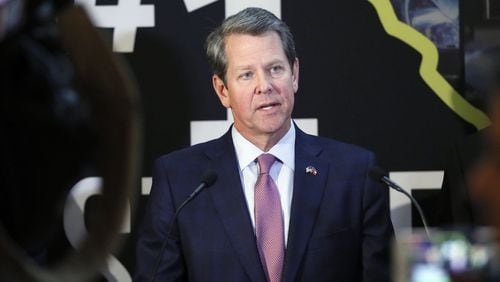With the stroke of a pen Wednesday, Gov. Brian Kemp regained broad powers to determine the health care coverage for hundreds of thousands of Georgians. And how he wields that new authority will help define his first term as governor.
Kemp signed legislation Wednesday that allows his administration to pursue two separate waivers with the federal government that could ease health care access for poor and middle-class Georgians and set a path toward limited Medicaid expansion, or that could advance conservative goals of reining in Medicaid's scope.
“By passing this legislation we have decided to abandon the status quo,” Kemp said at a ceremony before he signed the bill. “We are rolling up our sleeves and it is time to get to work.”
It’s no blank check: The new law gives him a limited timeline to fulfill the plan and forbade him from pursuing a full Medicaid expansion — which he has promised to oppose in any case. And there’s no guarantee the federal government will approve the waivers, despite Kemp’s alliance with President Donald Trump.
But it will allow Kemp’s office discretion to seek vast changes that could reshape Georgia’s health care system — changes that could echo in the next two statewide elections.
And it triggers a complicated, behind-the-scenes process that involves hiring a consultant to craft a plan, negotiate with health officials and politicians, mine statistical data and navigate the bureaucracy in Washington before it has a chance to become a part of the state’s health care fabric.
In interviews and public statements, Kemp has stressed that he understands the broad latitude he now has — a power that was stripped from the governor’s office in the teeth of the 2014 campaign. He has even more power than a governor would have had then, since even then a governor would have had to reach some kind of agreement with the Legislature on changing such a significant program. He’s pledged not to be a “Lone Ranger” and to insist on transparency.
"I understand and greatly appreciate the trust that has been given to me and my administration by the Legislature with this action," Kemp said Wednesday, flanked by House Speaker David Ralston and Lt. Gov. Geoff Duncan, who also attended the signing. "This process will remain transparent, and we will do what is right even when no one is watching."
He'll be under intense scrutiny from Democrats and health care advocates seething at the governor's new powers. They mock the state for putting aside $1 million for a consultant rather than embrace a full-on Medicaid expansion that would cover more people, possibly cost the state less money and, they say, spur more economic growth.
And Kemp's critics say the waiver process is a betrayal of the legislative branch, which for the past four years had the final say on any attempt to expand the Medicaid program. State Rep. Bob Trammell, the top Democrat in the House, called it nothing short of an "abdication" of duties. His allies have seconded him.
"This bill removes any oversight from this deliberative body," said state Rep. Mary Robichaux, D-Roswell. "How will success be measured? I do not see any such parameters in this bill. … The citizens of Georgia cannot wait for an experimental pilot or project."
The broad leeway given to Kemp is nothing like the specific directions and plans laid out in laws such as Utah's. The waiver legislation, Senate Bill 106, would allow Kemp to implement any type of change allowed by Medicaid law as long as it's approved by the federal government.
That could mean attempts at significant changes to Medicaid, said MaryBeth Musumeci, associate director of the Program on Medicaid and the Uninsured at the Kaiser Family Foundation, a research group.
Up to now GOP leaders in Georgia and the Trump administration have expressed interest in several types of cutbacks or caps on Medicaid funding. One possibility, Musumeci said, is for Georgia to request something like that in return for the Trump administration agreeing to shoulder 90 percent of the financial burden of expanding Georgia’s Medicaid population.
In such a case, the plan could wind up in court, with federal judges deciding whether it’s legal. On Wednesday, a federal judge in Washington ruled for the second time that work requirements in exchange for Medicaid are not legal because they do not advance the purpose of the Medicaid law. The rulings, concerning Kentucky’s and Arkansas’ programs, are likely headed to the U.S. Supreme Court.
The governor has offered few specifics about the complicated waiver process, saying that he wants to assess all his options. The law sets a deadline of June 30, 2020, to apply for the Medicaid waiver.
He, however, has dropped hints. His administration is likely to adopt elements of other waivers from other Republican-led states, such as an attempt at work requirements and a "high-risk pool" for Affordable Care Act insurance. He has signaled his interest in a waiver proposed by officials at Grady Memorial Hospital, which ran a pilot project to reduce inappropriate emergency room visits by "surrounding" such patients with lower-cost care, including social workers.
In his remarks Kemp made it clear he intends to lower government spending on Medicaid.
“Our Medicaid program costs too much and fails to deliver like it should,” he said. Listing industries in which Georgia is a national leader, he added: “We have the opportunity to lead in health care as well. Our state will reform a broken system with conservative solutions.”
Implementation of either the Medicaid changes or the Affordable Care Act insurance changes can begin after Jan. 1.
Until recently, there was no indication from Washington that Kemp's plan to pursue waivers had any chance of winning federal approval. But that changed this month when the nation's top Medicaid official said she's reviewing the agency's policies to give states more flexibility in administering the program.
The Trump administration is eager to head off the momentum for full Medicaid expansion by approving more limited waiver programs.
Still, even Kemp’s supporters caution that federal approval — which the governor hopes to secure before next year’s election — is no sure thing.
And if legislators really don’t like whatever the governor comes up with, Ralston told The Atlanta Journal-Constitution after the ceremony, it’s not the end of the world.
“The Legislature can always act on any proposal that the governor makes,” Ralston said. “We meet every year. We’ll be back next January. If we need to make some changes, we’ll have an opportunity to do that.”
Stay on top of what’s happening in Georgia government and politics at ajc.com/news/georgia-government/.









